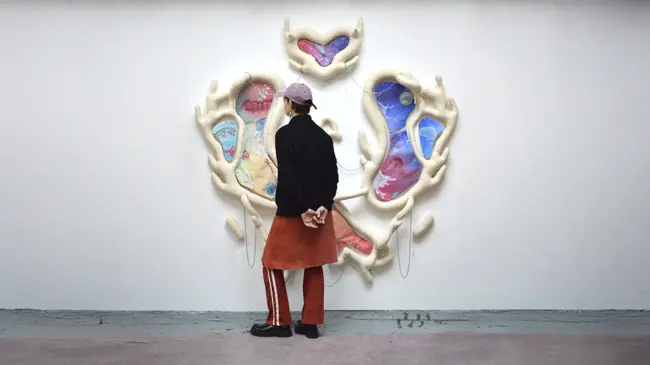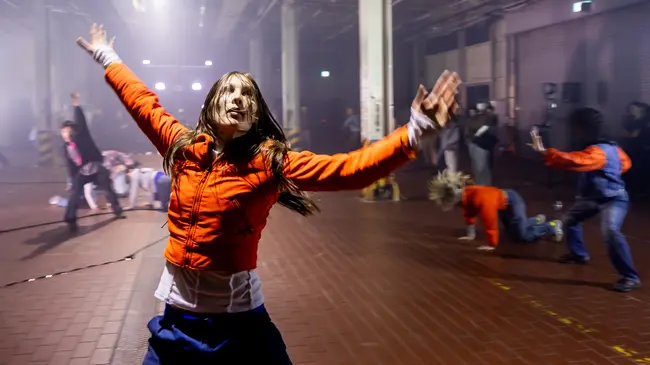We are the future, so it’s important to be on the same page

One of the projects participating in BOZAR’s Next generation, Please!, 'My space - My life' invited a group of young artists to explore space and related social issues through a series of workshops and focused discussion groups. The six artists then created their own projects for the exposition. We sat down with three of these artists, Lotte, Eva, and Michelle, to discuss their personal experiences, insights on space, and exploratory projects.
This project started online during lockdown. What was this experience like?
Michelle: It was actually my first time in Belgium during the second lockdown, so I decided to take these workshops as a kind of escape. Even though everything was online, this project provided something else, something for myself.
Lotte: During the calls, we talked a lot about ourselves, and our experiences. I thought it was really crazy because we opened up really fast. I think the online environment makes it easier to talk about these things.
Eva: I think online spaces open up a new kind of interaction. It was distant but very intimate. In my online classes as well, I felt very distant from my classmates, but I could see their living rooms and bedrooms. I saw the parts they wanted to show and the ones they didn't. It was a totally new way of getting to know people. I remember one person writing in the zoom chat 'welcome to my living room guys!' That made it a bit more fun.
I think online spaces open up a new kind of interaction

Which workshops did you participate in?
L: We could choose from four workshops; dance, spatial exploration, storytelling, and photography. We had a few weeks during which we could choose two workshops to participate in. I attended the dance workshop with Auke Mertens. She does something called authentic movement, which is just letting your body move, with or without music. It was almost meditation.
I also participated in the spatial exploration workshop, led by Desislava Petkova and Rosie Romero. We talked about our homes a lot and had to draw a plan for our houses, drawing circles in places that are more intimate. We talked about aspects of space, like intimacy and privacy and also things that fill our spaces like lights and plants. We questioned where we felt most comfortable and which places have changed since lockdown.
E: I did the storytelling and photography workshops. The storytelling workshop with Fleur Writz was really nice, we had to do these exercises to create a story, usually starting from a space or an object in the space. I remember one exercise in which we had to become an object and describe how we would see the room from that point of view. I was the water boiler. I thought the workshop was really cosy because I was just thinking and making up stories in my room during the lockdown.
M: I only followed the photography workshop, I am really into photography, so I wanted to explore a bit more. I had never had classes or a direct approach to a photographer or videomaker. Fani Bachvarova started with the basics of photography. She talked about how to focus certain elements, symmetry, and all the sectors of the screen. It was really fun because we were just taking random photographs of ourselves, in our rooms, sometimes just showing one part of our bodies. It was a sort of self-portrait so it was difficult to find the right light, zoom, or focus, but she pointed out how to improve the shots. We also discussed what photography was for ourselves and how we interpret photography itself.


What did you take from the workshops and discussions to use in your personal projects?
E: We had social discussions, focused on different social groups. We met people who already did research or projects on social issues with migrants or the problem of homelessness and houselessness.
There was one in particular that really inspired me. Guy Atkins, who is an artist and anthropologist, talked about how objects and spaces influence us. He used postcards to show that, by analyzing an object, you can tell a lot about a person, or the social conditions that gave form to that object. That is a theme that I wanted to take up in my project later. I wanted to see how spaces and our environment do influence us and how objects in a room influence how we interact with and see that room and ourselves.
I made a video about students. I interviewed them about meaningful spaces during the lockdown. The idea was that through talking about spaces, people could become more intimate. I never explicitly asked about their emotions, it just came naturally. One idea that came up a lot was the connection between space and meeting people. The real conclusion was that the space doesn’t really matter, it's the people in it that do.


M: I was inspired by everything I participated in, especially the photography workshop. I wanted to dive into the topic and explore as much as I can. My project is a montage of pictures I have taken over the years. It is about different landscaping, in Italy, Hungary, Belgium, Portugal, and everywhere else I have been. I wanted to recreate a personal journey. The project is called the Inner Walk because I don’t want to put my interpretation of it directly in the video. I want everybody to experience different emotions with it. I also recreated a sound where there are no words, only noises that you can associate with feelings you have in certain environments. It could be a journey from the morning to the night, from the silence to a crowded space, or really any interpretation. I wanted to make something not necessarily for myself, but for the visitors of the show.
I wanted to make something not necessarily for myself, but for the visitors of the show
L: I recreated a room, a bedroom for my project. This came out of the idea that every space has so many opportunities. Every space can be used as a room to house someone. There were three concepts that stuck with me through all of the social discussions and the workshops that I included in my room. First is the temporariness of the room. We visited a squat for one of the social discussions. It was in this big, empty, factory-like building, and was being used to house people who were going to the UK. It really hit me there that any space can be used for people to sleep in. In the building, you could see the temporariness. The place was not a home, it was just a place that they could stay. I was also inspired by the appropriation of spaces, and the idea of making a space your own, by hanging just one picture on the wall or putting up some decorations. The third element was everything I learned throughout the project. I made this diary-like booklet, with a lot of information I gathered, and also things that refer to this sense of temporariness. I have a page with QR codes for train tickets, to really show the journey of the person that inhabits this room. It is more like an installation with all of these aspects. It is going to be quite dark in the space, which also brings up the discussion of isolation.


What were your own spaces like during isolation?
L: For me, my room was a really dark space in COVID times. Because I was really always there, it became a place I didn't want to be. Starting this project showed me that I could change the space and make it my safe space again.
Starting this project showed me that I could change the space and make it my safe space again
E: I think through the project, especially the storytelling workshop, we were thinking a lot about meaning and the meaning of spaces, that I understood how lucky I was to have the house I lived in. I live in a student house with a lot of people, and I realized that I really liked the kitchen because it was a very cosy place. I also talked about it with my housemates, and we agreed that this place does really make people better, and you do become happier inside of this space. So that was just really nice to realize for myself.
M: For me, COVID was a really weird experience, because I actually have not been back home since the summer after the first lockdown, so I can not say my room is a dark space or cosy space, because I have not been in my room.


Do you think it is important for young people to be the ones discussing space and these issues?
E: I think these social issues are also really important right now and for the future for young people. Here in Ghent, they want to build these student houses in this forest, and there are these protests. There are a lot of students who are not studying in Ghent this year because they couldn’t find housing, so this question about how there is a lot of space, just not affordable space, and how can we give everyone a place to think and organize their life.
L: The theme of Next Generation Please! is about the future, and we are the future, so I think it’s important that we are all kind of on the same page.
Different Class works with the interest of their community at heart.
Our work’s purpose is to foster a solid network for independent artists, those who love them, and those who want to support them. Become a member to contribute to the local Belgian art scene.






